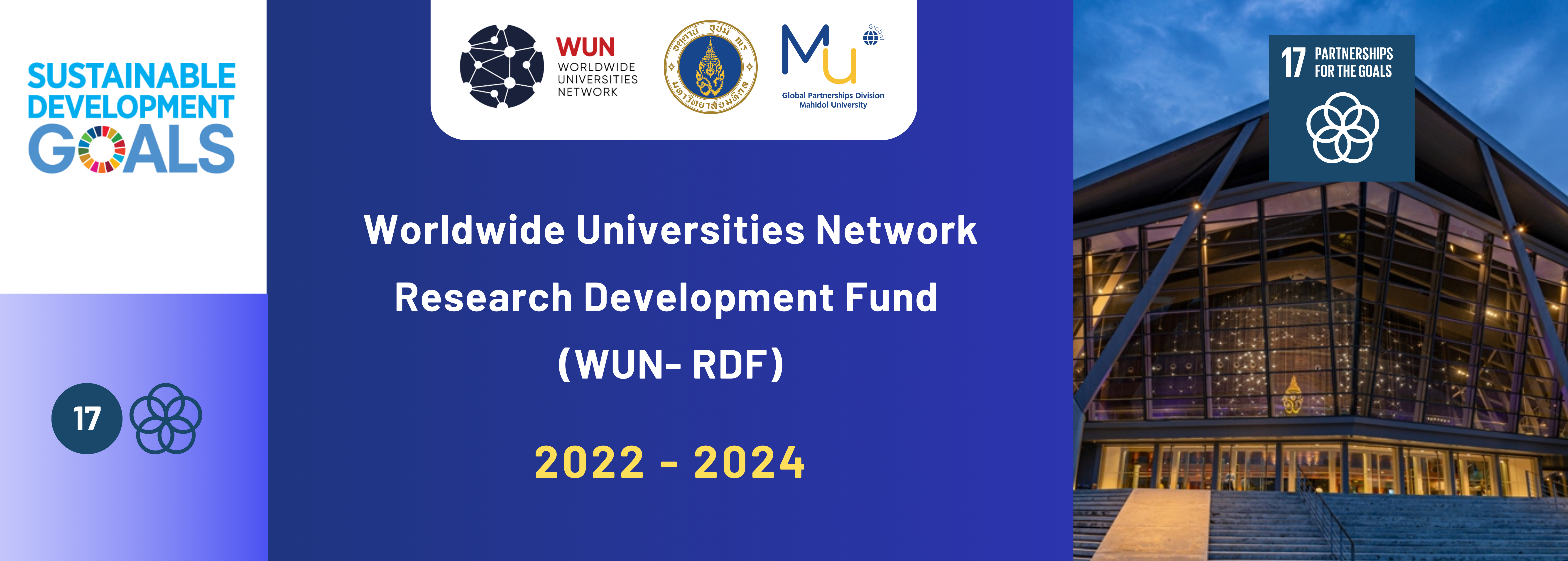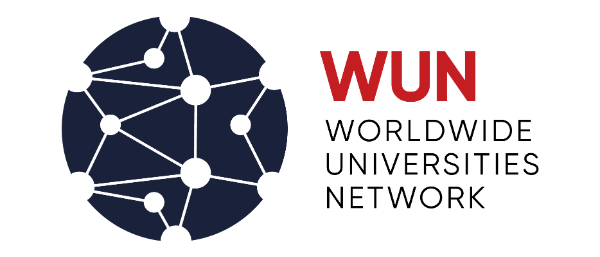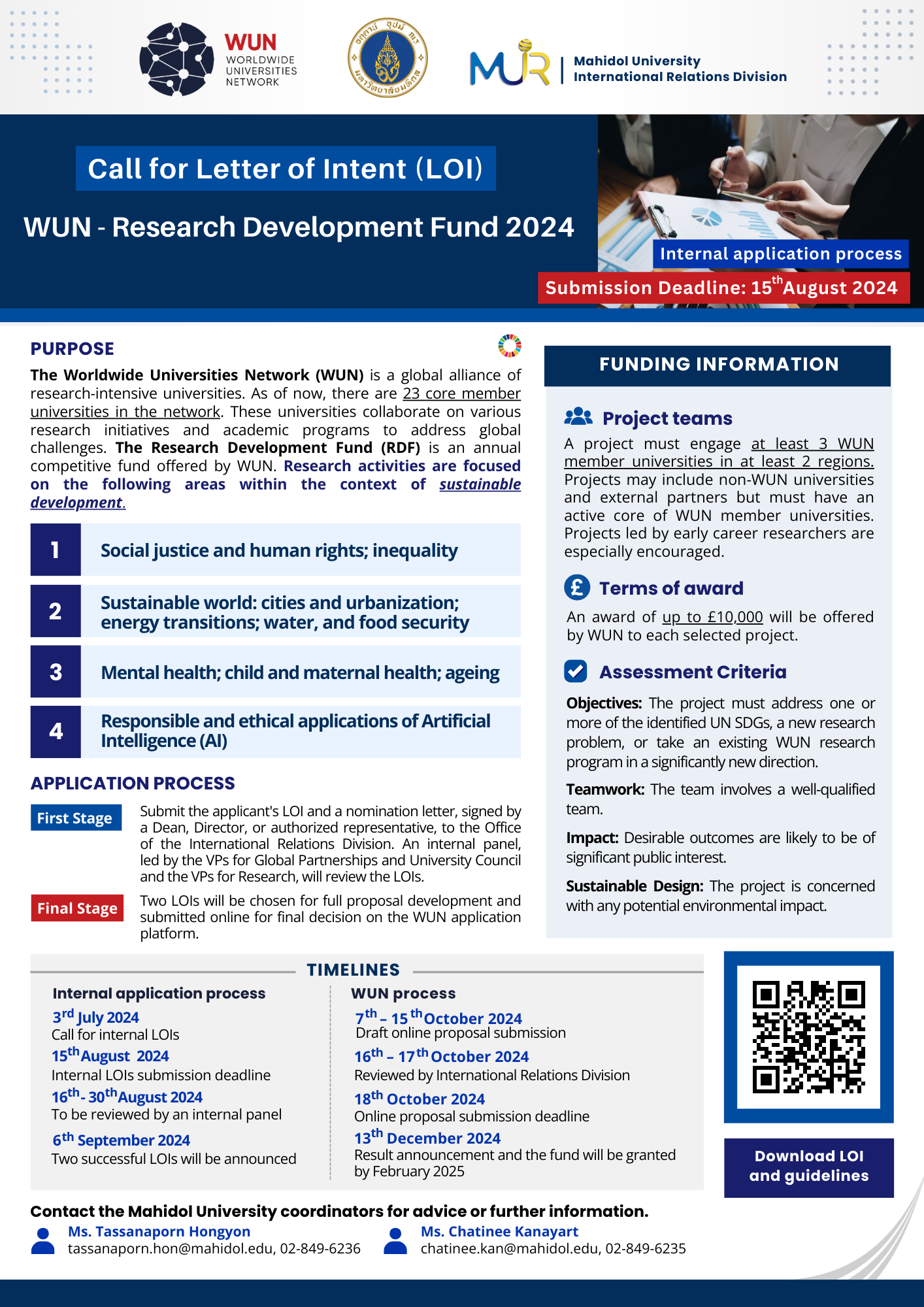2024 Call for Letters of Intent (LOI)
Worldwide Universities Network (WUN) Research Development Fund (RDF)
Mahidol University has joined the Worldwide Universities Network (WUN), a leading global higher education network connecting 23 research-intensive universities in Africa, the Americas, Asia, Europe, and Oceania.
WUN provides special programs for career development, including networking opportunities for researchers.
We invite Mahidol University’s researchers who are interested to submit the Letter of Intent (LOI) to apply for the WUN Research Development Fund (RDF) in the internal application process organized by the International Relations Division, Mahidol University.
Two successful applications will be announced to continue to apply in the WUN application process accordingly. For more information, please see below:

WUN-RDF 2024 Mahidol University Shortlist Announcement
Project title |
Mahidol Principal Investigator |
Affiliation |
Towards Net Zero and Environmentally Sustainable Food and Energy Systems with Innovative Circular Economy Solutions (NZS FOOD-ENERGY) |
Associate Professor Dr.
|
Faculty of Engineering |
Circular Economy Approach of Food Waste Management for Thai Fresh Markets |
Associate Professor Dr.
|
ASEAN Institute for Health Development
|
Purpose
The Worldwide Universities Network (WUN) is a global alliance of research-intensive universities. As of now, there are 23 member universities in the network. These universities collaborate on various research initiatives and academic programs to address global challenges. Research activities are focused on the following areas within the context of sustainable development.
1. Social justice and human rights; inequality
2. Sustainable world: cities and urbanization; energy transitions; water, and food security
3. Mental health; child and maternal health; ageing
4. Responsible and ethical applications of Artificial Intelligence
Funding information
Project teams. A project must engage at least 3 WUN member universities in at least 2 regions. Projects may include non-WUN universities and external partners but must have an active core of WUN member universities. Projects led by early career researchers are especially encouraged.
Terms of award: An award of up to £10,000 will be offered by WUN to each selected project.
Assessment Criteria:
-
Objectives: The project must address one or more of the identified UN SDGs, a new research problem, or take an existing WUN research program in a significantly new direction.
-
Teamwork: The team involves a well-qualified team.
-
Impact: Desirable outcomes are likely to be of significant public interest.
-
Sustainable Design: The project is concerned with any potential environmental impact.
Internal application process:
There is a two-stage application process for WUN applications, as Mahidol University is limited to two lead-RDF applications per call.
First stage: Submit the applicant’s LOI and a nomination letter, signed by a Dean, Director, or authorized representative, to the Office of the International Relations Division. An internal panel, led by the VPs for Global Partnerships and University Council and the VPs for Research, will review the LOIs.
Final stage: Two LOIs will be chosen for full proposal development and submitted online for final decision on the WUN application platform.
Timelines:
Date | Activities |
Internal application process | |
3 July 2024 | Call for internal LOIs |
15 August 2024 | Internal LOIs submission deadline |
16 - 30 August 2024 | To be reviewed by an internal panel |
6 September 2024 | Two successful LOIs will be announced |
WUN process | |
7 – 15 October 2024 | Draft online proposal submission |
16 – 17 October 2024 | Reviewed by International Relations Division |
18 October 2024 | Online proposal submission deadline |
13 December 2024 | Result announcement and the fund will be granted by February 2025 |
Towards Net Zero and Sustainable Cities with Resource Optimisation, Circular Economy and Research Network (NZS CITIES) | ||
Academic Lead Dr. Trakarn Prapaspongsa, Faculty of Engineering Mahidol University --------------------------------------------------------------- External Partners From
| WUN Research Team
| |
According to the Sustainable Development Report 2022, most countries around the world cannot achieve the sustainable development goal (SDG) 11 on sustainable cities and communities. This raises the importance in understanding and accelerating policies and practices to enhance the sustainability of cities. Meanwhile, cities are one of the key players driving the transformations to combat climate change and reach net-zero emissions. Although resource optimisation and circular economy have been proposed as potential solutions to these global and local challenges, their implementation has often been sluggish and fraught with problems. NZS CITIES aims to:
The project consists of two parts: research and network development. In the research part, we will apply systematic review and indicator-based tools. City data and performances will be analysed and benchmarked. In the network development part, we will virtually conduct meetings, seminars and young researcher workshop. Short newsletters and a website will be prepared/developed for internal and external communications. The outputs of this work including a systematic review paper, the network, the short newsletters and the website will help empower cities to achieve their net zero and sustainability targets. Applications for further funding on this research will support the continuity of this network in the long term. During the initial stage, NZS CITIES brings 23 professors/researchers, 4 PhD students and 1 master student from 12 universities in 5 regions (Asia, Africa, Europe, Oceania and North America) to work together. With this WUN initiative, we are able to have a wide span of 12 sub-themes listed below which can ensure that the comparative analysis and research network will be comprehensive and inclusive. At the end of the project, the network will be both strengthened and enlarged. 12 Sub–Themes of NZS CITIES
In the long-term, the research outcomes have the potential impacts to “lead” cities with pathways in optimising their resource use, reducing environmental impacts, as well as increasing economic and social productivities by benchmarking their climate actions and sustainability performances and enhancing the resource optimisation and circular economy technologies and policies. | ||
Reducing indigenous inequalities: Contextualizing strategies and policies for achieving community empowerment in different global regions | ||
Academic Lead Dr. Sumittra Suraratdecha, Research Institute for Languages and Cultures of Asia, Mahidol University --------------------------------------------------------------- External Partners From
| WUN Research Team
| |
The silencing of Indigenous languages has been part of colonialist efforts to suppress Indigenous cultures and deny Indigenous knowledge. Colonial and postcolonial language and social policies have resulted in personal/community insecurities and impediments, as well as the inequality of resource sharing and the loss of heritage knowledge. Throughout the world, efforts have been made to reclaim indigenous rights in many respects. By far, community empowerment emerges as the key to the sustainability of these efforts. The design of successful language and culture revitalization programs and effective language policies is contingent on their surrounding socio-cultural-political contexts. Local linguistic and cultural heritage is also seen as an asset, an invaluable form of capital for self- and community development in a creative economy context. Revitalization programs in different regions of the world may address different domestic issues, including social, cultural, political and economic factors. This project, therefore, adopts a comparative approach to examine strategies and policies endorsed in different parts of the world to reduce inequalities in local contexts. To promote “universal” social, economic, and political inclusion and ensure equal opportunities and end discrimination, both indicators of SDG 10, it is essential that international researchers share, exchange, and review the lessons learned and best practices from different parts of the world. This collaborative project aims to examine and compare:
With support from WUN Understanding Cultures Global Challenge Steering Group, we can draw on the wealth and diversity of our experiences; our network of international team members from indigenous communities and academia can become a global team who continue to work together to make a long-term impact and to inform policy on strategies to reduce inequalities and attract future funds. | ||
Responsible and Ethical AI for Future Actions: Sustainable Development through Web Article and Online Initiatives | ||
Academic Lead Dr. Tipajin Thaipisutikul, Faculty of Information and Communication Technology, Mahidol University --------------------------------------------------------------- External Partners From
| WUN Research Team
| |
The Research problem Overview of Current AI and Responsible AI Practices Artificial Intelligence (AI) is reshaping numerous sectors, impacting areas like education, healthcare, logistics, and the legal field. While AI introduces enhanced accuracy, innovation, and efficiency, it also brings about concerns related to potential risks, ethics, and long-term implications. The broader community often lacks a clear understanding of responsible AI practices, creating challenges. This has sparked a worldwide dialogue on AI’s governance, transparency, accountability, societal, legal, environmental, and ethical dimensions, as well as its unbiased application to prevent negative consequences and biases. Tools and guidelines for Ethical AI aim to address these concerns throughout AI’s development. Why it is important to scholars and/or society generally. Promoting responsible and ethical AI is challenging due to underdeveloped frameworks and varying progress rates across regions. Many organisations prioritise AI growth over responsible innovation. Existing frameworks often lack comprehensive implementation resources, and ethical tools don’t seamlessly connect theory with practice. No universal tool or platform captures the advancement of responsible AI globally. As AI integration grows across industries, there’s a pressing need for AI skills. Yet, there’s a significant gap in individuals proficient in responsible AI, underlining the need for online training programs in AI ethics and explainability. Research Design Our approach is threefold. Firstly, we will launch online AI courses designed by multidisciplinary experts and share them on a YouTube playlist. Secondly, we will conduct an online symposium, gathering professionals from various sectors to share expertise; each network partner will bring in another participant. Finally, based on thorough research, we will craft a web article comparing responsible AI methodologies and tools. Project Objectives This project, therefore, plans to tackle the above challenges with the following plans.
| ||
The Role of Human Rights in the Prevention of State Perpetrated Nationalist Hate Speech and Disinformation | ||
Academic Lead Dr. Mike Hayes, Institute of Human Rights and Peace Studies , Mahidol University | WUN Research Team
| |
Hate speech is becoming a global phenomenon with increases in homophobic, racist, and sexist speech. However, most discussions focus on private or individual offences, and do not look closely at speech which is instigated and disseminated by States. Through negative nationalism, nationalist paranoia, or simply hate-mongering, governments use hate speech in a variety of ways to garner support or in election campaigning. This phenomenon, which is more widely recognised in countries such as Myanmar, Russia, and Turkey, has been used in many other places. This study will explore how this hate speech is disseminated, and the challenges to confront it. A key area of investigation is why specific groups, such as youth, non-citizens, sexual minorities, or ethnic minorities, are targeted, and the challenges to confront State based hate speech. The Research problem While there are many studies on hate speech, there is a limited understanding of how to respond to State-based, or electoral hate speech. Even though it is a well-known tool of autocratic regimes and seen as a key element in the authoritarian handbook, many responses to hate speech rely on State actions, such as legislation, monitoring by government agencies, or public service education. These responses will be ineffective if it is the State itself conducting the violation. Hate speech perpetrated by a State is challenging to combat or prevent because speech by State officials is often protected. Criticising States or senior government officials in many countries is illegal or dangerous. Further, political groups can be adept at signalling hate speech without explicitly engaging in it, for example the tactics of ‘gaslighting’ or ‘dog whistling.’ Research Design The research project asks the question: Are current human rights or national non-discrimination standards sufficient to counter State based hate speech? To do this the research team, comprising of four universities, will collaborate on writing a research article on the legal, political, and social context to hate speech, from both a regional and global perspective, as the universities are from four separate regions. The second phase of the research project is to develop educational resources that can be used in a relevant undergraduate course. The objective of the educational resource is so students are more attuned to identify, and possibly counter, State based hate speech. This learning resource will be in both English and a regional language (selected by the regional lead researcher) The learning resource could take the form of a chapter for a textbook with additional teaching materials, which may be, for example, small group exercises, case studies, legal analysis, debates, or role plays. The research project will be led by the Institute of Human Rights and Peace Studies at Mahidol University, in partnership with the Centre of Human Rights at University of Pretoria, Maastricht University, and Universidade Federal de Minas Gerais. By bringing together researchers from different regions, this research aims to study regional or national characteristics and certain target groups, focusing on youth and children with connections to education, crime, and sexuality, as well as ethnic and religious minorities, migrant workers, including refugees. Project Objectives Aligned with the WUN Strategic Plan of 2023-2026, which aims to achieve sustainable development and foster international research collaboration, the project addresses social justice, human rights, and inequality, seeking to reduce and eliminate hate speech by governments. The expected output is a collaboration of research articles on the legal, political, and social context of hate speech, both from regional and global perspectives. Resources will also be utilised as additional teaching materials for undergraduates to raise awareness of the state’s perpetration of human rights violations. | ||

Main indicators of goal achievement: Establish the collaboration and research, review comparative approaches, and develop international best practices for tackling the SDGs.
SDGs Aligned with the Activity:
-
Primary SDG: SDG 17 – Partnerships for the Goals (Strengthen the means of implementation and revitalize the global partnership for sustainable development)
-
Related SDG: SDG 17.2 – Relationships to support the goals
-
Sub-SDG: SDG 17.2.4 – Collaboration for SDG best practice Through international collaboration and research, review comparative approaches and develop international best practice on tackling the SDGs
MU strategy: Education for Sustainability
Partner: Worldwide Universities Network (WUN)
Stakeholders:
-
Worldwide Universities Network (WUN)
-
Mahidol University
-
Faculty of Engineering (EG)
-
Faculty of Information and Communication Technology (ICT)
-
Research Institute for Languages and Cultures of Asia (RILCA)
-
Institute of Human Rights and Peace Studies (IHRP)









